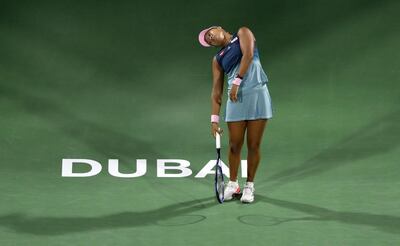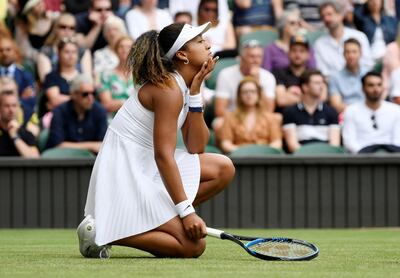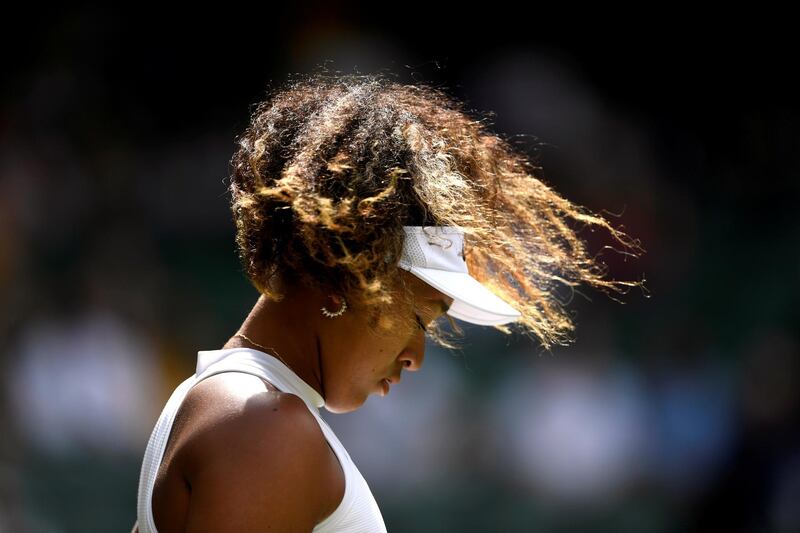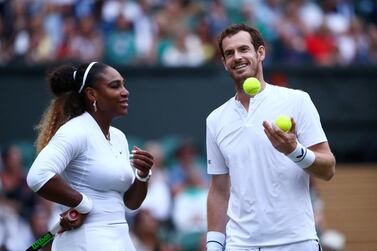With the first week of Wimbledon behind us, Naomi Osaka’s opening round loss to Yulia Putintseva last Monday may feel like a distant memory, yet it is still being heavily deliberated by fans and pundits alike.
After becoming the first woman since Jennifer Capriati in 2001 to follow her first grand slam title – at the US Open – with another at her next major – at the Australian Open – Osaka suffered early defeats in both Roland Garros (third round to Katerina Siniakova) and Wimbledon, and in the process lost her No 1 ranking to Ashleigh Barty.
Since lifting her second major in Melbourne in January, Osaka has picked up 13 wins against seven losses. Her most notable results during that period were semi-finals in Stuttgart, and quarters in Madrid and Rome.
Following her early dismissal in Birmingham last month – also against Putintseva – Osaka skipped out on her mandatory post-match press conference, opting to pay a fine rather than face the media.
At Wimbledon after her first round stumble, she had to cut her press conference short, telling the moderator: “Can I leave? I feel like I'm about to cry,” before making a tearful exit.
Has Osaka been overhyped? Is the pressure becoming too much for the Japanese-Haitian superstar? Is she in a slump? Will she be able to win more majors? Is it time to start worrying about her?
Osaka’s journey has taken her from outside the top-70 at the start of the 2018 season, to the summit of the rankings 12 months later. She shot to global superstardom and was even named among Time’s 100 most influential people.
She has signed seven new endorsement deals since last August, with her list of sponsors now including Mastercard, Nissan, Nike and All Nippon Airways.
“You know the song 'Mo Money Mo Problems'? Man, oh, man,” she told a reporter with a smile during her pre-Wimbledon press conference. “There might not necessarily be more problems, but I'm definitely over-thinking more.”
Patrick Mouratoglou, the coach of Serena Williams, whom Osaka beat in the US Open final last September, tries to analyse the young Japanese’s current state.
"I think people are worried because she looks unhappy, generally speaking. She looks like she's suffering from the situation," Mouratoglou told The National at the All England Club.
“It’s a fact that she doesn’t look very comfortable and happy, like she was maybe when she was winning the two grand slams. I also feel like the pressure is hurting her.
"I think she won back-to-back grand slams because she didn’t think too much and she didn’t realise what she was doing and then she became No 1. I think at that point suddenly she realised everything and all the pressure came on her.”

Osaka's first event as world No 1 was the Dubai Duty Free Tennis Championships in February. She lost her opening match in terrible fashion to Kristina Mladenovic and teared up while speaking to the press after.
Months later, she tries to explain how it felt occupying that top spot.
“Mentally it was way more stress and pressure than I could have imagined. I don't think there was anything that could have prepared me for that,” she said at Wimbledon.
Mouratoglou believes it’s normal for Osaka to feel this way.
“It’s something so many players went through, almost all of them at some point. Being No 1 and staying No 1 for a while – Serena didn’t stay No 1 for a long time before doing it for three years and a half after turning 30,” said the French coach.
“It’s something that’s very difficult to handle; not to have the right to fail, feeling that you’re supposed to win every time and especially when you’re doubting yourself because you’re losing matches and you feel the pressure.
“Remember [Angelique] Kerber, how much it affected her? I think they’re all human, it’s just human experience and she shouldn’t put too much pressure on herself. Just look at the other ones, you’re not the only one, it’s tough. And it’s a learning experience.”

Petra Kvitova can attest to that. The Czech captured her first grand slam aged 21 Wimbledon in 2011, but it took her three years before she could a second major to her name, also in SW19.
“I remember how I felt. It was a totally different life after winning Wimbledon for the first time. I just didn't really know what is going to be like. It was huge for me. Suddenly all the media attentions, the sponsor things. I just couldn't really handle it. Just put so much pressure on myself,” Kvitova said last week.
“Suddenly I felt that I just have to win every match I play because I just won a grand slam, especially Wimbledon. It's like, ‘OK, this is not really happening afterwards’. It's always putting you little bit down. I'm not sure how Naomi feels, but it's how I felt it.”
Asked how she got past that feeling, Kvitova replied: “I think you just kind of give up. If you love the sport, you just keep going. I always find the motivation to be better and better. That's how I probably kind of beat this pressure. Being on the tour for so many years with those expectations and experiences, being really in the top, it makes you little bit stronger I think against it.”
Indeed, in life, and in tennis, you cannot really cheat time. Osaka's universe has dramatically changed within a short period and it'll probably take her a while to figure out how to function in her new reality. She also abruptly parted ways with her coach Sascha Bajin after winning the Australian Open – a decision that was met with a lot of public scrutiny.

“Could there be a little bit of a reaction to winning a second slam in a row when you're 21? If there isn't a reaction, she's not human, so there has to be a reaction,” said Swedish great Mats Wilander, who won the first of his seven majors when he was just 17.
“I think the surprising thing for me was that she didn't do that well during Miami and Indian Wells, but with the split from her coach right after Australia, it takes some time to find yourself and find the right person.”
Wilander disagrees with the notion that Osaka is going through some sort of “crisis”, noting that clay and grass are not her favourite surfaces. He expects her to rebound once the season goes back to hard courts in a couple of weeks’ time.
Osaka described her learning curve on grass as a “humbling experience”, but she also alluded to the fact that she needs to rediscover the joy on the court to get back to winning ways.
American Sloane Stephens, who stunned the world when she won the US Open in 2017, just two months after returning from a year-long injury hiatus, knows all too well the weight that can descend on a player’s shoulders after enjoying a huge breakthrough.

Stephens went on an eight-match losing streak after lifting the US Open trophy but has since recovered to win big titles like Miami, and reach another grand slam final, this time in Paris.
“There is obviously a lot of pressure and a lot of expectations, and you put pressure on yourself because you want to do well and you want to live up to whatever it is that everyone is writing and talking about,” said 26-year-old Stephens.
“That takes a lot of energy. I think sometimes people forget that tennis is ‘the’ No 1 priority, and for you to have the results you want and to keep that level, you have to continue to keep your tennis first.
“I think sometimes that becomes secondary when you have a lot of other things going on. At least that's how it was for me. I just was tired.
“Sometimes you get overworked and overwhelmed. It can happen, but I think just kind of finding that right balance and kind of just reprioritising everything, it helped with me.
“Obviously with Naomi, she'll find whatever it is the correct balance is for her, but obviously her results and what she's done in the last year or so have been incredible. I think that's really, really awesome. But I think she needs to probably take care of herself a little bit better so she can feel better."







